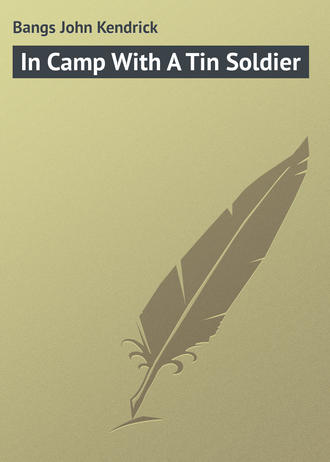 полная версия
полная версияIn Camp With A Tin Soldier
"I'm not afraid of the colonel," said Jimmieboy, bravely.
"Neither are we," said the corporal, in reply to this, "but we don't like to have our campaign delayed, and when the colonel loses his temper we have to wait and wait until he finds it again. Sometimes it takes him a whole week."
So Jimmieboy, wondering more and more at the singular habits of the tin soldiers, ran off in search of the colonel, whom he found sitting by the brook-side fishing, and surrounded by his staff.
"Hello!" said Jimmieboy, as he caught sight of the colonel. "Having any luck?"
"Lots," said the colonel. "Been here only five minutes, and I've caught three hickory twigs, a piece of wire, and one of the finest colds in my head I ever had."
"Good," said Jimmieboy, with a laugh. "But aren't there any fish there?"
"Plenty of 'em," answered the colonel. "But they're all so small I'd have to throw 'em back if I caught 'em. They know that well enough, and so save me trouble by not biting. But I say, I suppose you know we can't start this expedition without ammunition?"
"What's that?" queried Jimmieboy, to whom the word ammunition was entirely new.
"Ammunition? Why, that's stuff to load our guns with," returned the colonel. "You must be a great general not to know that."
"You must excuse me," said Jimmieboy, with a blush. "There is a great deal that I don't know. I'm only five years old, and papa hasn't had time to tell me everything yet."
"Well, it's all right, anyhow," replied the colonel. "You'll learn a great deal in the next hundred years, so we won't criticise; but of course, you know, we can't go off without ammunition any more than a gun can. Now, as general of the forces, it is your duty to look about you and lay in the necessary supplies. For the guns we shall need about fourteen thousand rounds of preserved cherries, seventeen thousand rounds of pickled peaches for the cannon, and a hundred and sixty-two dozen cans of strawberry jam for me."
Jimmieboy's eyes grew so round and large as he listened to these words that the major turned pale.
"Then," continued the colonel, "we have to have powder and shell, of course. Perhaps four hundred and sixteen pounds of powdered sugar and ninety-seven barrels of shells with almonds in 'em would do for our purposes."
"But – but what are we to do with all these things, and where am I to get them?" gasped Jimmieboy, beginning to be very sorry that he had accepted so important a position as that of general.
"Do with 'em?" cried the colonel. "What'll we do with 'em? Why, capture the Parallelopipedon, of course. What did you suppose we'd do with 'em – throw them at canary-birds?"
"You don't load guns with preserved cherries, do you?" asked the boy.
"We don't, eh? Well, I just guess we do," returned the colonel. "And we load the cannon with pickled peaches, and to keep me from deserting and going over to the enemy, they keep me loaded to the muzzle with strawberry jam from the time I start until we get back."
"You can't kill a Parawelopipedon with cherries and peaches, can you?" asked Jimmieboy.
"Not quite, but nearly," said the colonel. "We never hit him with enough of them to kill him, but just try to coax him with 'em, don't you see? We don't do as you do in your country. We don't shoot the enemy with lead bullets, and try to kill him and make him unhappy. We try to coax him back by shooting sweetmeats at him, and if he won't be coaxed, we bombard him with pickled peaches until they make him sick, and then he has to surrender."
"It must be pretty fine to be an enemy," said Jimmieboy, smacking his lips as he thought of being bombarded with sweetmeats.
"It is," exclaimed the colonel, with enthusiasm. "It's so nice, that they have to do the right thing by me in the matter of jam to keep me from being an enemy myself."
"But what do I get?" returned Jimmieboy, who couldn't see why it would not be pleasant for him to be an enemy, and get all these delightful things.
"You? Why, you get the almonds and the powdered sugar and all the mince-pie you can eat – what more do you want?" said the colonel.
"Nothing," gasped Jimmieboy, overcome by the prospect. "I wouldn't mind being a general for a million years at that rate."
With which noble sentiment the little fellow touched his cap to the colonel, and set off, accompanied by a dozen soldiers, to find the cherries, the peaches, the almonds, and the powdered sugar.
CHAPTER III.
MAJOR BLUEFACE TRIES TO ASSIST
THE expedition under Jimmieboy's command had hardly been under way a quarter of an hour when the youthful general realized that the colonel had not told him where the cherries and peaches and other necessary supplies were to be found.
"Dear me," he said, stopping short in the road. "I don't know anything about this country, and I am sure I sha'n't be able to find all those good things – except in my mamma's pantry, and it would never do for me to take 'em from there. I might have to fight cook to get 'em, and that would be dreadful."
"Yes, it would," said Major Blueface, riding up as Jimmieboy spoke these words. "It would be terribly awful, for if you should fight with her now, she wouldn't make you a single pancake or pie or custard or anything after you got back."
"I'm glad you've come," said Jimmieboy, with a sigh of relief. "Perhaps you can tell me what I've got to do to get that ammu – that ammu – oh, that ammuknow, don't you?"
"Ammunition?" suggested the major.
"Yes, that's it," said Jimmieboy. "Could you tell me where to get it?"
"I could; but, really," returned the major, "I'm very much afraid I'd better not, unless you'll promise not to pay any attention to what I say."
"I don't see what good that would do," said Jimmieboy, a little surprised at the major's words. "What's the use of your saying anything, if I am not to pay any attention to you?"
"I'll tell you if you'll sit down a moment," was the major's reply, upon which he and Jimmieboy sat down on a log at the road-side.
The major then recited his story as follows:
"THE MAJOR'S MISFORTUNEWhen I was born, some years ago,The world was standing upside down;Pekin was off in Mexico,And Paris stood near Germantown.The moon likewise was out of gear.And shone most brilliantly by day;The while the sun did not appearUntil the moon had gone away.Which was, you see, a very strange,Unhappy way of doing things,And people did not like the change,Save clods who took the rank of kings.For kings as well were going wrong,And 'stead of crowns wore beaver hats,While those once mean and poor grew strong;The dogs e'en ran from mice and rats.The Frenchman spoke the Spanish tongue,The Russian's words were Turkestan;And England's nerves were all unstrungBy cockneys speaking Aryan.Schools went to boys, and billie-goatsDrove children harnessed up to carts.The rivers flowed up hill, and oatsWere fed to babies 'stead of tarts.With things in this shape was I born.The stars were topsy-turvy all,And hence it is my fate forlornWhen things are short to call them tall;When thing are black to call them white;And if they're good to call them bad;To say 'tis day when it is night;To call an elephant a shad.And when I say that this is this,That it is that you'll surely know;For truth's a thing I always miss,And what I say is never so.""Poor fellow!" cried Jimmieboy. "How very unpleasant! Is that really a true story?"
"No," returned the major, sadly. "It is not true."
And then Jimmieboy knew that it was true, and he felt very sorry for the major.
"Never mind, major," he said, tapping his companion affectionately on the shoulder. "I'll believe what you say if nobody else does."
"Oh, don't, don't! I beg of you, don't!" cried the major, anxiously. "I wouldn't have you do that for all the world. If you did, it would get us into all sorts of trouble. If I had thought you'd do that, I'd never have told you the story."
"Very well," said Jimmieboy, "then I won't. Only I should think you'd want to have somebody believe in you."
"Oh, you can believe in me all you want," returned the major. "I'm one of the finest fellows in the world, and worthy of anybody's friendship – and if anybody ought to know, Jimmieboy, I'm the one, for I know myself intimately. I've known myself ever since I was a little bit of a boy, and I can tell you if there's any man in the world who has a noble character and a good conscience and a heart in the right place, I'm him. It's only what I say you mustn't believe in. Remember that, and we shall be all right."
"All right," said Jimmieboy. "We'll do it that way. Now tell me what you don't know about finding preserved cherries and pickled peaches. We've got to lay in a very large supply of them, and I haven't the first idea how to get 'em."
"H'm! What I don't know about 'em would take a long time to tell," returned the major, with a shake of his head, "because there's so much of it. In the first place,
"I do not knowIf cherries growOn trees, or roofs, or rocks;Or if they comeIn cans – ho-hum! —Or packed up in a box.Mayhap you'll findThe proper kindDown where they sell red paint;And then, you see,Oh, dear! Ah, me!And then again you mayn't.""That appears to settle the cherries," said Jimmieboy, somewhat impatiently, for it did seem to him that the major was wasting a great deal of valuable time.
"Oh, dear me, no!" ejaculated the major. "I could go on like that forever about cherries. For instance:
"You might perchanceGet some in France,And some in Germany;A crate or twoIn far Barboo,And some in Labradee.""Where's Labradee?" asked Jimmieboy.
"It's Labrador," said the major, with a smile; "but Labradee rhymes better with Germany, and as long as you know I'm not telling the truth, and are not likely to go there, it doesn't make any difference if I change it a little."
"That's so," said Jimmieboy, with a snicker. "But how about those peaches? Do you know anything that isn't so about them?"
"Oh, yes, lots," said the major.
"I know that when the peach is green,And growing on the tree,It's harder than a common bean,And yellow as can be.I know that if you eat a peachThat's just a bit too young,A lesson strong the act will teach,And leave your nerves unstrung.And, furthermore, I know this fact:The crop, however haleIn every year before 'tis packed,Doth never fail to fail.""That's very interesting," said Jimmieboy, when the major had recited these lines, "but it doesn't help me a bit. What I want to know is how the pickled peaches are to be found, and where."
"Oh, that's it, is it?" said the major. "Well, it's easy enough to tell you that. First as to how you are to find them – this applies to huckleberries and daisies and fire-engines and everything else, just as well as it does to peaches, so you'd better listen. It's a very valuable thing to know.
"The way to find a pickled peach,A cow, or piece of pumpkin pie,A simple lesson is to teach,As can be seen with half an eye.Look up the road and down the road,Look North and South and East and West.Let not a single episodeCome in betwixt you and your quest.Search morning, night, and afternoon,From Monday until Saturday;By light of sun and that of moon,Nor mind the troubles in your way.And keep this up until you getThe thing that you are looking for,And then, of course, you need not fretAbout the matter any more.""You are a great help," said Jimmieboy.
"Don't mention it, my dear boy," replied the major, so pleased that he smiled and cracked some of the red enamel on his lips. "I like to be useful. It's almost as good as being youthful. In fact, to people who lisp and pronounce their esses as though they were teeaitches, it's quite the same. It was very easy to tell you how to find a pickled peach, but it's much harder to tell you where. In fact, I don't know that I can tell you where, but if I were not compelled to ignore the truth I should inform you at once that I haven't the slightest idea. But, of course, I can tell you where you might find them if they were there – which, of course, they aren't. For instance:
"Pickled peaches might be foundIn the gold mines underground;Pickled peaches might be seenRolling down the Bowling Green;Pickled peaches might spring upIn a bed of custard cup;Pickled peaches might sprout forthFrom an ice-cake in the North;I have seen them in the SouthIn a pickaninny's mouth;I have seen them in the WestHid inside a cowboy's vest;I have seen them in the EastAt a small boy's birthday feast;Maybe, too, a few you'd seeIn the land of the Chinee;And this statement broad I'll dare:You might find them anywhere.""Thank you," said Jimmieboy. "I feel easier now that I know all this. I don't know what I should have done if I hadn't met you, major."
"It's very unkind of you to say so," said the major, very much pleased by Jimmieboy's appreciation. "Of course you know what I mean."
"Yes," answered Jimmieboy, "I do. Now I'll tell you what I think. I think pickled peaches come in cans and bottles."
"Bottles and cans,Bottles and cans,When a man marries it ruins his plans,"quoted the major. "I got married once," he added, "but I became a bachelor again right off. My wife wrote better poetry than I could, and I couldn't stand that, you know. That's how I came to be a soldier."
"That hasn't anything to do with the pickled peaches," said Jimmieboy, impatiently. "Now, unless I am very much mistaken, we can go to the grocery store and buy a few bottles."
"Ho!" jeered the major. "What's the use of buying bottles when you're after pickled peaches?
'Of all the futile, futile things —Remarked the Apogee —That is as truly futilestAs futilest can be.'You never heard my poem on the Apogee, did you, Jimmieboy?"
"No. I never even heard of an Apogee. What is an Apogee, anyhow?" asked the boy.
"To give definitions isn't a part of my bargain," answered the major. "I haven't the slightest idea what an Apogee is. He may be a bird with a whole file of unpaid bills, for all I know, but I wrote a poem about him once that made another poet so jealous that he purposely caught a bad cold and sneezed his head off; and I don't blame him either, because it was a magnificent thing in its way. I'll tell it to you. Listen:
"THE APOGEEThe Apogee wept saline tearsInto the saline sea,To overhear two mutineersDiscuss their pedigree.Said he:Of all the futile, futile thingsThat ever I did see.That is as truly futilestAs futilest can be.He hied him thence to his hotel,And there it made him illTo hear a pretty damoselA bass song try to trill.Said he:Of all the futile, futile things —To say it I am free —That is about the futilestThat ever I did see.He went from sea to mountain height,And there he heard a ladOf sixty-eight compare the sightTo other views he'd had;And heRemarked: Of all the futile thingsThat ever came to me,This is as futily futileAs futile well can be.Then in disgust he went back home,His door-bell rang all day,But no one to the door did come:The butler'd gone away.Said he:This is the strangest, queerest worldThat ever I did see.It's two per cent. of earth, and nine-Ty-eight futility.""Isn't that elegant?" added the major, when he had finished.
"It sounds well," said Jimmieboy. "But what does it mean? What's futile?"
"Futile? What does futile mean?" said the major, slowly. "Why, it's – it's a word, you know, and sort of stands for 'what's the use.'"
"Oh," replied Jimmieboy. "I see. To be futile means that you are wasting time, eh?"
"That's it," said the major. "I'm glad you said it and not I, because that makes it true. If I'd said it, it wouldn't have been so."
"Well, all I've got to say," said Jimmieboy, "is that if anybody ever came to me and asked me where he could find a futile person, I'd send him over to you. Here we've wasted nearly the whole afternoon and we haven't got a single thing. We haven't even talked of anything but peaches and cherries, and we've got to get jam and sugar and almonds yet."
Here the major smiled.
"It isn't any laughing matter," said Jimmieboy. "It's a very serious piece of business, in fact. Here's this Parawelopipedon going around ruining everything he can lay his claws on, and instead of helping me out of the fix I'm in, and starting the expedition off, you sit here and tell me about Apogees and other things I haven't time to hear about."
"I was only smiling to show how sorry I was," said the major, apologetically.
"I always smile when I am sad,And when I'm filled with gleeA solitary tear-drop trick-Les down the cheek of me.""Oh, that's it," said Jimmieboy. "Well, let's stop fooling now and get those supplies."
"All right," assented the major. "Where are the soldiers who accompanied you? We'll give 'em their orders, and you'll have the supplies in no time."
"How's that?" queried Jimmieboy.
"Why, don't you see," said the major, "that's the nice thing about being a general. If you have to do something you don't know how to do, you command your men to go and do it. That lifts the responsibility from your shoulders to theirs. They don't dare disobey, and there you are."
"Good enough!" cried Jimmieboy, delighted to find so easy a way out of his troubles. "I'll give them their orders at once. I'll tell them to get the supplies. Will they surely do it?"
"They'll have to, or be put in the guard-house," returned the major. "And they don't like that, you know, because the guard-house hasn't any walls, and it's awfully draughty. But, as I said before, where are the soldiers?"
"Why!" said Jimmieboy, starting up and looking anxiously about him. "They've gone, haven't they?"
"They seem to have," said the major, putting his hand over his eyes and gazing up and down the road, upon which no sign of Jimmieboy's command was visible. "You ordered them to halt when you sat down here, didn't you?"
"No," said Jimmieboy, "I didn't."
"Then that accounts for it," returned the major, with a scornful glance at Jimmieboy. "They've gone on. They couldn't halt without orders, and they must be eight miles from here by this time."
"What'll happen?" asked the boy, anxiously.
"What'll happen?" echoed the major. "Why, they'll march on forever unless you get word to them to halt. You are a gay general, you are."
"But what's to be done?" asked Jimmieboy, growing tearful.
"There are only two things you can do. The earth is round, and in a few years they'll pass this way again, and then you can tell them to stop. That's one thing you can do. The second is to despatch me on horseback to overtake and tell them to keep right on. They'll know what you mean, and they'll halt and wait until you come up."
"That's the best plan," cried Jimmieboy, with a sigh of relief. "You hurry ahead and make them wait for me, and I'll come along as fast as I can."
So the major mounted his horse and galloped away, leaving Jimmieboy alone in the road, trudging manfully ahead as fast as his small legs could carry him.
CHAPTER IV.
JIMMIEBOY MEETS THE ENEMY
AS the noise made by the clattering hoofs of Major Blueface's horse grew fainter and fainter, and finally died away entirely in the distance, Jimmieboy was a little startled to hear something that sounded very like a hiss in the trees behind him. At first he thought it was the light breeze blowing through the branches, making the leaves rustle, but when it was repeated he stopped short in the road and glanced backward, grasping his sword as he did so.
"Hello there!" he cried. "Who are you, and what do you want?"
"Sh-sh-sh!" answered the mysterious something. "Don't talk so loud, general, the major may come back."
"What if he does?" said Jimmieboy. "I rather think I wish he would. I don't know whether or not I'm big enough not to be afraid of you. Can't you come out of the bushes and let me see you?"
"Not unless the major is out of sight," was the answer. "I can't stand the major; but you needn't be afraid of me. I wouldn't hurt you for all the world. I'm the enemy."
"The what?" cried Jimmieboy, aghast.
"I'm the enemy," replied the invisible object. "That's what I call myself when I'm with sensible people. Other people have a long name for me that I never could pronounce or spell. I'm the animal that got away."
"Not the Parallelopipedon?" said Jimmieboy.
"That's it! That's the name I can't pronounce," said the invisible animal. "I'm the Parallelandsoforth, and I've been trying to have an interview with you ever since I heard they'd made you general. The fact is, Jimmieboy, I am very anxious that you should succeed in capturing me, because I don't like it out here very much. The fences are the toughest eating I ever had, and I actually sprained my wisdom-tooth at breakfast this morning trying to bite a brown stone ball off the top of a gate post."
"But if you feel that way," said Jimmieboy, somewhat surprised at this unusual occurrence, "why don't you surrender?"
"Me?" cried the Parallelopipedon. "A Parallelandsoforth of my standing surrender right on the eve of a battle that means all the sweetmeats I can eat, and more too? I guess not."
"I wish I could see you," said Jimmieboy, earnestly. "I don't like standing here talking to a wee little voice with nothing to him. Why don't you come out here where I can see you?"
"It's for your good, Jimmieboy; that's why I stay in here. I am an awful spectacle. Why, it puts me all in a tremble just to look at myself; and if it affects me that way, just think how it would be with you."
"I wouldn't be afraid," said Jimmieboy, bravely.
"Yes, you would too," answered the Parallelopipedon. "You'd be so scared you couldn't run, I am so ugly. Didn't the major tell you that story about my reflection in the looking-glass?"
"No," answered Jimmieboy. "He didn't say anything about it."
"That's queer. The story is in rhyme, and the major always tells everybody all the poetry he knows," said the invisible enemy. "That's why I never go near him. He has only enough to last one year, and the second year he tells it all over again. I'm surprised he never told you about my reflection in the mirror, because it is one of his worst, and he always likes them better than the others."
"I'll ask him to tell it to me next time I see him," said Jimmieboy, "unless you'll tell it to me now."
"I'd just as lief tell you," said the Parallelopipedon. "Only you mustn't laugh or cry, because you haven't time to laugh, and generals never cry. This is the way it goes:
"THE PARALLELOPIPEDON AND THE MIRRORThe Parallelopipedon so very ugly is,His own heart fills with terror when he looks upon his phiz.That's why he wears blue goggles – twenty pairs upon his nose,And never dares to show himself, no matter where he goes.One day when he was walking down a crowded village street,He looked into a little shop where stood a mirror neat.He saw his own reflection there as plain as plain could be;And said, 'I'd give four dollars if that really wasn't me.'And, strange to say, the figure in the mirror's silver faceWas also filled with terror at the other's lack of grace;And this reflection trembled till it strangely came to passThe handsome mirror shivered to ten thousand bits of glass.To this tale there's a moral, and that moral briefly is:If you perchance are burdened with a terrifying phiz,Don't look into your mirror – 'tis a fearful risk to take —'Tis certain sure to happen that the mirror it will break.""Well, if that's so, I guess I don't want to see you," said Jimmieboy. "I only like pretty things. But tell me; if all this is true, how did the major come to say it? I thought he couldn't tell the truth."
"That's only as a rule. Rules have exceptions. For instance," explained the Parallelopipedon, "as a rule I can't pronounce my name, but in reciting that poem to you I did speak my name in the very first line – but if you only knew how it hurt me to do it! Oh dear me, how it hurt! Did you ever have a tooth pulled?"
"Once," said Jimmieboy, wincing at the remembrance of his painful experience.
"Well, pronouncing my name is to me worse than having all my teeth pulled and then put back again, and except when I get hold of a fine general like you I never make the sacrifice," said the Parallelopipedon. "But tell me, Jimmieboy, you are out after preserved cherries and pickled peaches, I understand?"
"Yes," said Jimmieboy. "And powdered sugar, almonds, jam, and several other things that are large and elegant."
"Well, just let me tell you one thing," said the Parallelopipedon, confidentially. "I'm so sick of cherries and peaches that I run every time I see them, and when I run there is no tin soldier or general of your size in the world that can catch me. Now what are we here for? I am here to be captured; you are here to capture me. To accomplish our various purposes we've got to begin right, and you might as well understand now as at any other time that you are beginning wrong."









